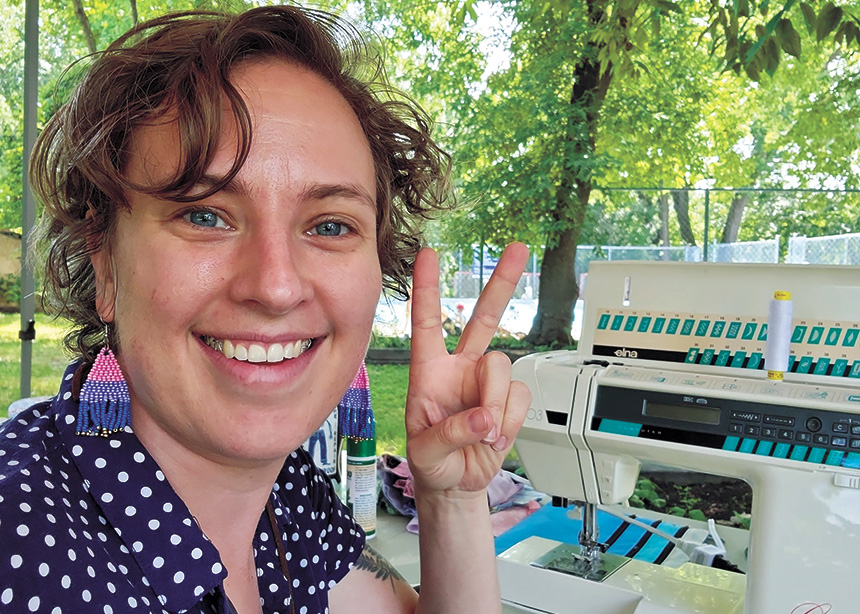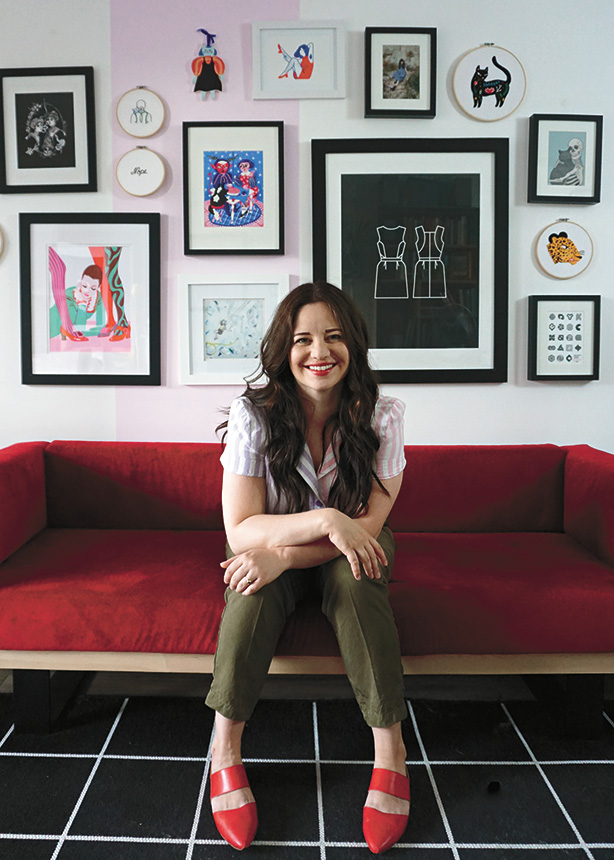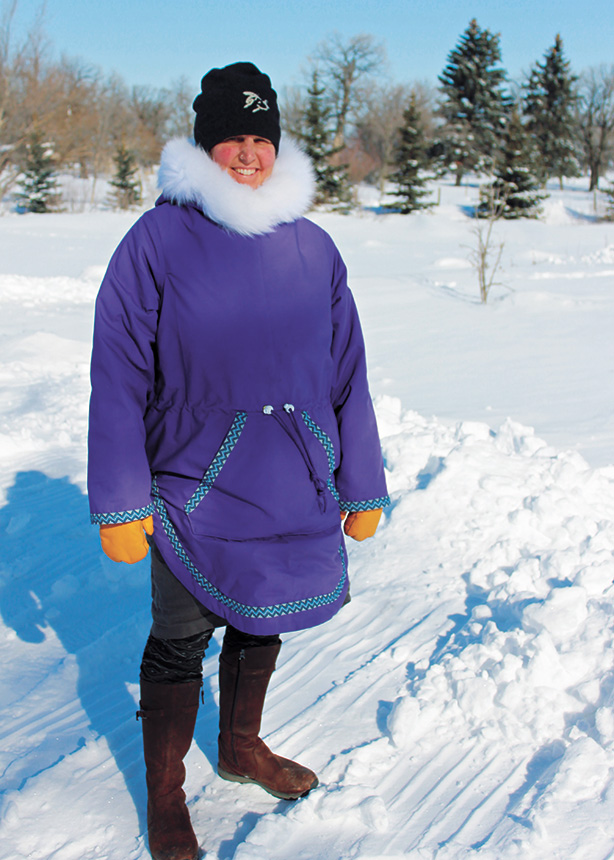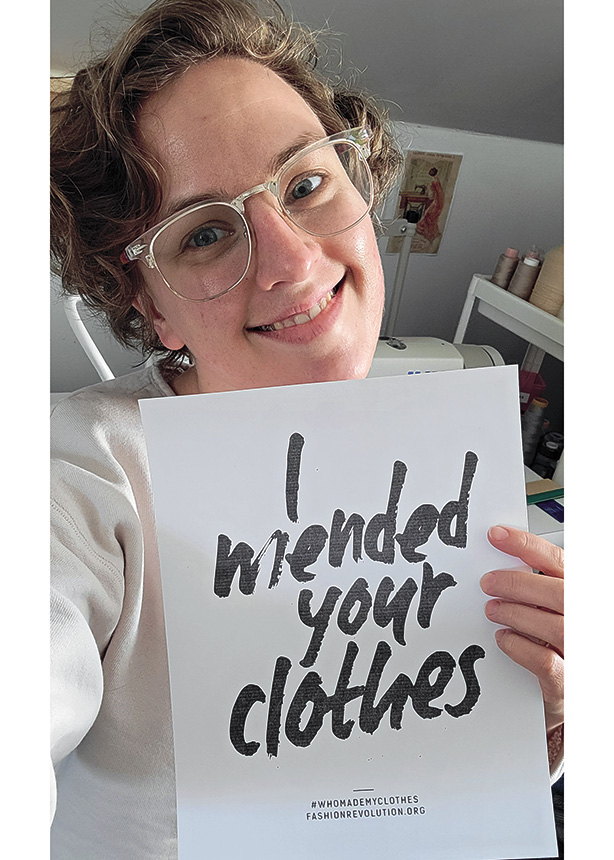“An estimated 92 million tons of textile waste is created annually from the fashion industry,” Fashion Revolution reported in 2020, citing Global Fashion Agenda. “Every second, the equivalent of one garbage truck of textiles is landfilled or burned globally.”
In 2022, Bloomberg published that “fashion accounts for up to 10 percent of global carbon-dioxide output—more than international flights and shipping combined, according to the United Nations Environment Programme.” It also reported the clothing industry’s most-used textile is now polyester, a plastic fibre derived mainly from petroleum.
Much of the fashion industry exploits the Earth and its people, and the problem is increasing, despite years of growing awareness around it.
So, whether you have a passion for fashion or barely think about what you put on each morning, every person makes choices that have impacts.
“Clothing is a fundamental way in which we interact with the world,” says Anna-Marie Janzen, founder and operator of Reclaim Mending, a textile repair and tailoring service based in Winnipeg. “It’s right up there with eating. These are things that impact the world at large, not just the world around us . . . globally, this is one of our biggest impacts.”
There is a stereotype, rooted in some truth, that Mennonites discourage paying too much attention to clothing and appearances, thinking it frivolous and vain. Yet no one is exempt from the fashion crisis.
“We all have to wear clothes. Very few of us in Canada live in climates where being a nudist is an option,” Janzen says wryly. “Especially for Mennonites throughout history, clothing has been a way we identify ourselves. It is a way we express who we are and it still is for a lot of communities.”
She patches jeans, hems dresses and gives vintage sweaters new life. She started her business in 2015, and it’s now a full-time job that she does with another full-time employee. She has been mending things for people her whole life, since her grandmother taught her to sew and repair clothing.
Extending the life of a garment is essential to sustainable fashion, because the most important action any individual can take is actually the absence of one: to not buy more clothing.
“The most ethical wardrobe is the one that is already in your closet,” says Jennifer deGroot, a small farmer, homemaker and sewist. “It’s so simple, and yet people avoid it.”
DeGroot and her family run Big Oak Farm near Morden, Man., and attend St. Julian’s Table, an affiliate congregation of Mennonite Church Manitoba. They raise sheep, laying hens, bees, and gardens of vegetables and flowers for themselves and members of their agriculture share, as well as to sell at markets.
Her passion for aligning her diet and closet with the well-being of other people and the environment started decades ago. “As a young feminist in my teens, I was keenly aware that the things I used in my everyday life were often connected in very negative ways to women in other parts of world,” she says.
Her clothing and groceries that came from the store contributed to inequality for women sewing in factories with dangerous working conditions or raising children alone while their husbands left for months at a time to earn money as migrant workers in the fields.
DeGroot began sewing her own clothes to mitigate this problem, but also because she loves fashion and its capacity for creativity and self-expression. She wanted her clothes to fit well, unlike mainstream clothes that are made to fit proportions few people actually have. In addition to raising sheep for wool, she is experimenting with growing flax to make linen and spinning her fibre into yarn.
“Our relationship with clothes is an incredible opportunity for being able to act justly in the world,” she says.
You don’t need to know how to sew in order to get involved. “There are so many ways to approach slow fashion, and it doesn’t all involve turning this into your [whole] life,” says Elise Epp, a graphic designer and sustainable fashion advocate.
She is the country coordinator for Fashion Revolution Canada, a global movement that began after the 2013 collapse of the Rana Plaza building of garment factories in Bangladesh, which killed more than 1,100 people. “The goal is through grassroots efforts to work towards a more safe and fair fashion industry,” Epp says of the initiative that has chapters in 75 countries.
This year’s edition of the organization’s annual Fashion Revolution Week is April 22–29. There are many ways to take action other than mending and making clothes, Epp says. Join the local Fashion Revolution chapter. Buy from thrift shops. Lobby governments for legislative changes. Demand transparency from fashion companies.
DeGroot says churches can organize clothing swaps, and host mending circles and repair workshops. Often older members of congregations have these skills that the younger generation hasn’t learned.
Epp emphasizes the importance of people putting money toward their values when they do go shopping, paying more for ethically made, higher-quality garments. Mennonites may be the royalty of reusing, but they are also known to be frugal, which can be a problem.
“Our frugality is at odds with our charity,” she says. “We will buy the products that push people into poverty and then feel good about ourselves for giving to charities that help people in poverty. . . . [M]any people could reassess their budgets and put more of their money towards paying people responsibly to begin with, so they aren’t put into situations that require charity.”
Frugality and charity offer more immediate rewards than investment in sustainable clothing systems.
Epp doesn’t believe that withholding her business from massive corporations like Amazon or Shein will topple their empires or cause widespread change. It’s more about living her life in a way that feels true to herself: “As much as I can, I want to live a life that’s in accordance with my values.”
Epp acknowledges many people struggle to do this because of barriers like limited finances and non-inclusive size offerings. Her advice: “Buy the best quality you can afford, and take care of it.”
Do you have a story idea about Mennonites in Manitoba? Send it to Nicolien Klassen-Wiebe at mb@canadianmennonite.org.











Leave a Reply
You must be logged in to post a comment.